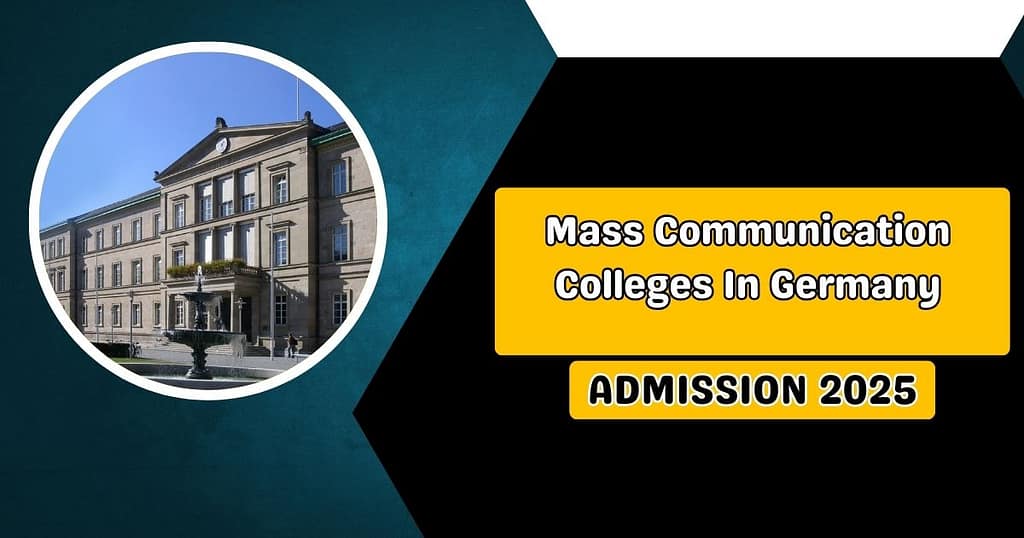
Media studies is an expansive field that arranges the experiences, content, and effects of different aggregate specialized techniques and instruments, focusing on broad communications. The discipline highlights the hypothetical and social methodology of correspondence sciences, mass correspondence, and correspondence studies. Media uses ideas and methods from different fields, such as social science, humanities, brain research, governmental issues, financial matters, and theory. Broad communications allude to the applied investigation of various practices and innovations used to work with data correspondence for huge crowds.
Hypothetical investigations in broad communications underline points like the historical backdrop of broad communications and its social effect, with a top-to-bottom comprehension of the correspondence hypothesis and an insightful way to deal with the improvement of new media.
Instructing is underlined in German colleges over research, with research being the focal point of free foundations known for their conventional way of dealing with sociologies. For understudies who wish to seek a degree in brain science, humanities, reasoning, or social science, acknowledgment into one of these examination colleges is very aggressive and outfitted towards understudies who have shown excellent ability and brightness towards a specific field.
Germany has been named by a few global instructive gatherings as the strongest nation for understudies wishing to acquire degrees in a country other than theirs. Supplementing this acknowledgment is how the educational cost charged by numerous German colleges is insignificant to none, further making concentrating in Germany an alluring and energizing possibility for understudies wishing to go to class in a country not the same as theirs.
In this article, findmecollege has presented the top 10 Mass Communication colleges in Germany along with the other details:

1. Eberhard Karls University, Tübingen
It is a public German Excellence University situated in the city of Tübingen, Baden-Württemberg. It is one of Germany’s well-known and most seasoned colleges, globally noted in medicine, inherent sciences, and the humanities. In the aesthetic sciences, the Tübingen is essential for having the main personnel for the way of talking in Germany – Walter Jens, a significant scholar, established the division. Since essentially the nineteenth 100 years, Tübingen has been the home of a-list research in ancient investigations and the investigation of classical times, including the investigation of the old Near East; a specific focal point of the exploration here at the University of Tübingen has been Anatolia, e.g., through the proceeded with unearthings of the college at Troy.
2. Johannes Gutenberg University (Jgu), Mainz
It is a state-funded college in Germany. Home to the north of 31,000 understudies from more than 120 nations, the JGU is known for its assorted culture. Programs presented at JGU incorporate 76 fortes and 289-degree programs, and the college is well-known for its exploration programs. Confirmations at the college require no application and educational expense, but worldwide understudies are expected to pay a global acknowledgment charge of 60 EUR alongside different expenses to concentrate in Germany. Confirmations at the University of Mainz are presented in various projects, such as humanities, financial aspects, social and legitimate sciences, innate sciences, etc.
3. University Of Hamburg
It is northern Germany’s biggest college of higher learning and schooling, with an absolute understudy populace of 43,957 in the colder time of year semester of 2019-20. This incorporates 10,221 new enlistments. More than 70 lone rangers and 100 expert programs are accessible at the University of Hamburg. These are presented by the eight resources: regulation, business, financial aspects, and sociology; schooling; medication; humanities; math, informatics, and inherent sciences; brain research and human development; and business organization.
4. Heinrich Heine University, Düsseldorf
It is situated in Düsseldorf, Germany, and is named after German writer and political scholar Heinrich Heine, who was brought into the world in Düsseldorf in 1797. It turned into an undeniable college in 1965, and right now, it contains resources in regulation, medication, theory, math, innate sciences, and financial aspects.
As a grounds college where everything is near one another, all structures, including the University Hospital and the particular libraries, are effectively reachable.
5. Technical University Dresden (TUD)
It is the biggest college with a background mark of just about 200 years. As a public German college, TU Dresden charges no educational expenses. Notwithstanding, dissimilar to different colleges, it offers no grants to global understudies. Those looking for subsidizing to learn at TUD must investigate outer financing choices like DAAD Scholarships, Heinrich Boll Scholarship, etc. Specialized University of Dresden offers a broad scope of UG and PG programs north of 124 scholastic regions through its 17 resources and five scholarly schools. The programs presented by the college are taught in German and English.
6. University Of Augsburg
Laid out in 1970, it is a state-funded college in Bavaria, Germany. The University has eight schools that offer 90 undergrad and graduate projects in review areas like Arts, Science, Business, Economics, Engineering, Mathematics, and Law. Designing, Physics, Education, and so forth. The University of Augsburg praises exceptional accomplishments in science and society and the extraordinary resources granted a privileged doctorate every year. Over 40 lone ranger’s bachelor’s and State Examination programs, 50 bosses’ projects, and eight resources exist. Some well-known offices include the Faculty of Law, Faculty of Business and Financial Matters, etc.
7. Technical University Of Dortmund
Situated in the Ruhr area of Germany, it was laid out in 1958. When Germany saw a decrease in the coal and steel industry, since the rise of the university, there was an efficient shift from a weighty industry towards innovation. The college involves 16 resources across scholarly teaching, from science and design to sociologies and culture studies. The college additionally gloats of a Centre for Teacher Training, four focal logical foundations, seven related research organizations, and five associated establishments, including the German Institute for Civic Art.
8. University Of Music And Perform Arts Munich
The groundwork of the university was made in 1830. The college has presented North of 100 projects – UG, PG, and further training endorsement programs. Around 35% of global understudies are in these courses.
UG programs in Music Instruments, Ballet, Music and Cultural Management, Music Journalism, Theatrical Profession, and others are accessible. PG programs for practically all the UG degree programs are proposed to the global understudies.
9. University Of Leipzig
It is one of the prominent colleges in Germany in the field of examination and clinical mastery. The college has 14 resources with over 130 foundations, focuses, and 17 focal organizations. College of Leipzig offers 155 undergraduate and postgraduate projects in regulation, expressions, sciences, interchanges, and unknown dialects, and that is only the tip of the iceberg. Programs at the postgraduate level are an MSc in Advanced Spectroscopy in Chemistry, an MA in Anthropology, an MA in British Studies, an LLM in European Private Law, an MSc in economic turn of events, an MA in semantics, and others.
10. Freie University Berlin
It is a leading exploration organization. It is one of the German colleges that has been fruitful in every one of the three subsidizing lines in the government and state Excellence Initiative, consequently getting extra financing for its institutional future improvement procedure.
Advancement and appraisal of exploration projects happen inside different center regions, research organizations, and stages for interdisciplinary cooperative examination. Other organizations and offices are spread over the Dahlem grounds. The School of Business and Economics, the Department of Law, and the Otto Suhr Institute for Political Sciences are arranged close to the Henry Ford Building and the University Library.
Related Articles:






